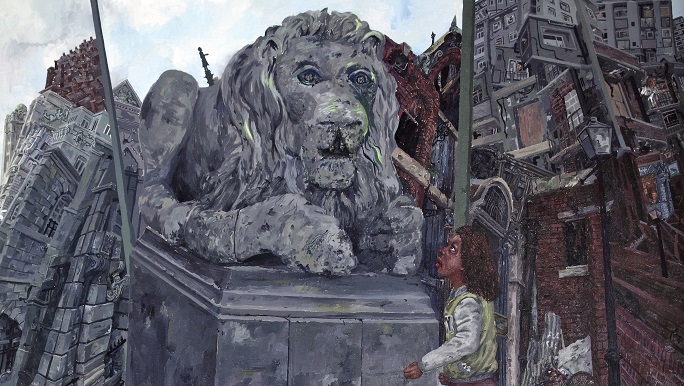
Liverpool by Tony Phillips
A young girl looks up at one of the famous stone lions outside St George’s Hall in Liverpool. How does she and the lion represent our city’s past and hopes for the future? Let’s look closer at this painting by Liverpool-born artist Tony Phillips and find out more.
Posted on: 30 October 2020
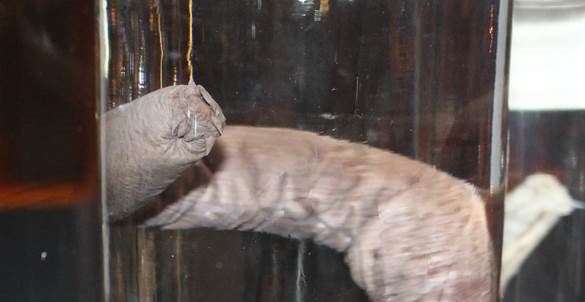
In Celebration of Hagfish Day!
Most people agree that one of the most repulsive specimens in our Nightmares in a Bell Jar display is the hagfish – but this doesn’t mean that hagfish don’t deserve our attention and protection. That is the message behind Hagfish day, which is on the third Wednesday of October – every year. \n
Posted on: 21 October 2020
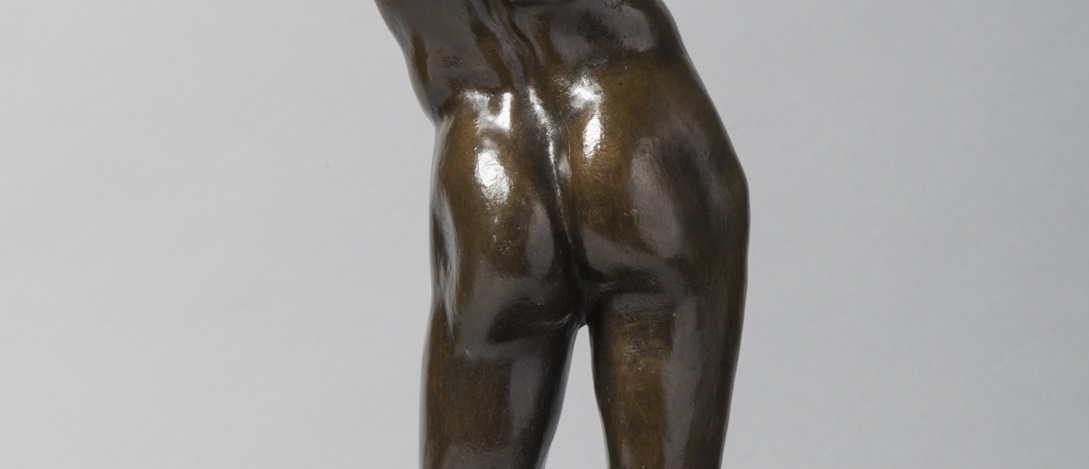
More than just a Cheeky Bum
In recent weeks a particular part of one of our sculptures has been getting a lot of attention: its buttocks. They have featured in the Liverpool Echo and on various social media platforms including one called @museumbums (yes, really …). But there is more to ‘The Sluggard’ than its pert behind, so let’s get to the bottom of the story. \n
Posted on: 16 October 2020
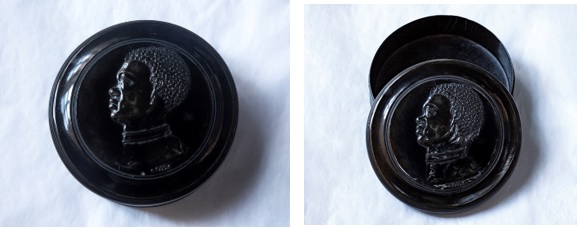
Slavery and Snuff
Sometimes, as a museum curator, you are responsible for items in the collection that you find distasteful and even upsetting. And yet, they represent a story that needs to be told. Here is a little snuff-box which represents a huge injustice in history: the transatlantic slave trade.
Posted on: 6 October 2020
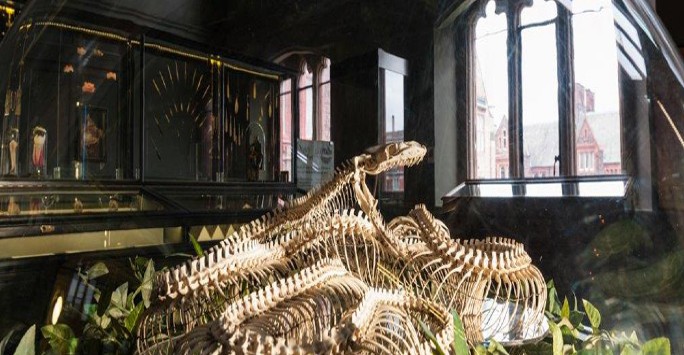
Bone of Contention
As you enter the Tate museum one of the first parts of the natural history collections that greets you is this incredible skeleton of a python. The museum has a large collection of natural history including full skeletons of mammals from gorillas to tiny mammal skulls, taxidermy teaching models and osteology teaching models (real skeletons prepared and articulated and mounted on wood). The python being the most intricate and impressive in my opinion of the teaching models deserves this week’s blog spotlight. You can look at it for a long time and marvel at the amount of bones a python skeleton has, work out how they function and move but what is incredibly striking is the workmanship in creating such a fascinating model, who made it and why?
Posted on: 18 September 2020
.jpg)
The Lady with the 5 o’clock shadow
Dr Amanda Draper, Curator of Art & Exhibitions writes …\nWhen I first arrived at the VG&M in January 2018 there was one painting in the building that hypnotised me. It had come into the collection in 2000 with no known title and had been descriptively labelled as ‘Portrait of a woman wearing a blue silk dress holding a jasmine flower’ by unknown artist. But there was an elephant in the room. The lower half of the sitter’s face, with its amiable if slightly pensive expression, appeared to be covered by a 5 o’clock shadow. They looked in distinct need of a close shave. What was the story here?
Posted on: 3 September 2020
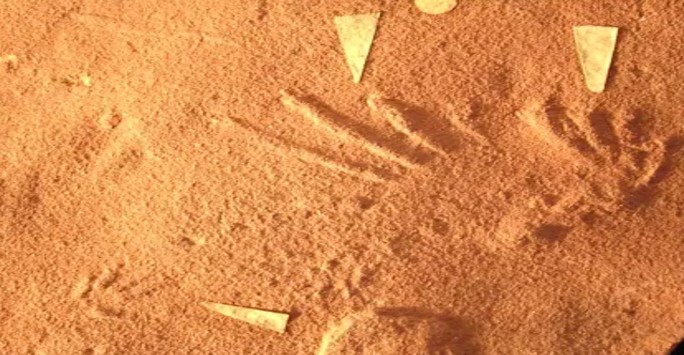
A Fossil For Friday -The Oldest Object in the Collection
We are almost certain that this footprint made by ‘Beasley’s type D2 Rhynchosaurides Rectipes’ which has been dated as over 240,000,000 years old, is the object that most accurately fits this week’s blog description.
Posted on: 27 August 2020
.jpg)
The Mystery of the Floating Hand
Amanda Draper, Curator of Art & Exhibition writes …\nAs a curator who looks after art collections, one of my favourite things is working with the specialist conservators who restore and revive artefacts for us. Their technical and artistic skills are phenomenal and they can completely transform an artwork that most of us would have thought beyond repair. And just sometimes, simply cleaning a painting can reveal unexpected wonders. And so it was with The Turkish Ambassador.
Posted on: 21 August 2020
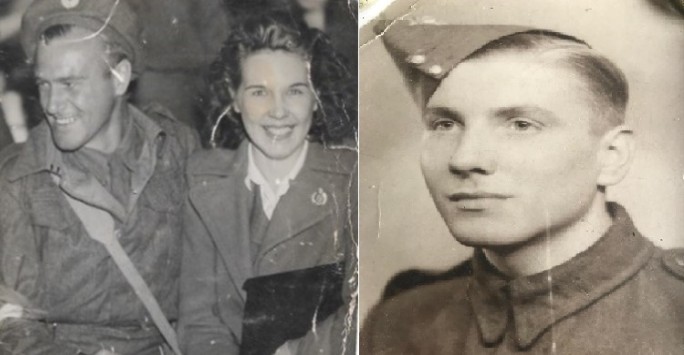
75th Anniversary of VJ Day Liverpool 2020, Connections and Reflections.
This Saturday the 15th of August is 75th anniversary of the Victory Over Japan Day, VJ Day, marking both the surrender of Japan and the end of the Second World War. The surrender effectively ended the war and allowed British soldiers, who had been fighting in Burma and those held captive across southeast Asia and the Far East, to return home. At least 20,000 of these men (as well as hundreds of civilian internees) disembarked in Liverpool between 8 October and the end of December that year. The remainder either returned via Southampton or, in the case of a few, flew back and were the first to arrive home during September. \n
Posted on: 14 August 2020
Blog

Liverpool by Tony Phillips
A young girl looks up at one of the famous stone lions outside St George’s Hall in Liverpool. How does she and the lion represent our city’s past and hopes for the future? Let’s look closer at this painting by Liverpool-born artist Tony Phillips and find out more.
Posted on: 30 October 2020
Disclaimer
We try to ensure that the information provided on our blog is accurate and that appropriate permissions to use images have been sought.
The opinions in each blog are very much those of the individuals writing.